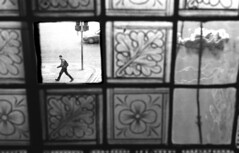
Most of my poems are short, rarely longer than a page. To some extent, this reflects the kind of poetry I like to read. I’ve always been attracted to shapely but sturdy little vessels: sonnets, epigrams, haiku, messages in bottles.
About 25 years ago, while walking through a state plantation in Co Wicklow, I stepped for a moment off the dirt-track and into the rows of young conifers. I inhaled the sweet-sour, needly air, took in the ash-brown dimness, heard the faint susurrus of wind in the higher branches. Even in that uniform, fledgling forest I felt a slight but definite shift, a distancing, as if a door on the late 20th Century had creaked softly shut. A vision crept over me, of Ireland’s ancient, post-glacial fur – the whole island covered in dense woodland – and a phrase came: “woods stuffy with silence.”
The first effort was a short, ten-line poem in rhyming couplets, all of which I later discarded except for that phrase. This eventually became part of the first of a four-page sequence of short poems, Footholds, beginning from a standpoint around 10,000 years ago, before even the first migrant settlers arrived on our island, and leaving off in a dreamspace crossroads in Dublin somewhere between the middle ages and the 20th Century.
While doing an MA in poetry in 1994 I read Gerard Murphy’s fascinating cribs in his Early Irish Lyrics and wrote versions based on some of these, one of which made its way into the sequence.
Footholds was first published in 1997 in the New Writers’ Anthology ‘What Will We Do When We Get There?’ There was still something that bothered me about it though; it seemed unfinished, ungainly. Some years later I brought Footholds to a masterclass with Paul Muldoon. He came up with a brilliantly simple solution, realising that the sequence broke naturally into two shorter ones (at least), the first fitting neatly on one page, ending before the evolution of early Celtic art and the written word. This shorter version was published a couple of years ago in The Shop. The rest I have tried to redraft into a three-page sequence, Handholds. I had intended to place this at or near the end of my forthcoming collection, The Sky Road, but then had second thoughts. Still too ungainly perhaps, a dropped lizard’s tail longer than the lizard.
HANDHOLDS
Spiral. We set it down where we can, a ripple
on tombs, brooches, stones, the pattern of holes
in a soup-strainer. Sacred and inscrutable, the line
has got under our skin. The scrolled-up symbol sleeps
tight, waiting to uncoil.
****
Though we’ve housed them soundly, the dead,
their voices reach us, restlessness
of leaves, grass, clouds, those words
on the tips of their tongues.
****
Safe in the firelit dark.
Safe in the sunlit wood.
Safe as a well-fenced field.
Safe as our guarded cattle.
Safe as a crannog, a ring-fort.
Still, often we tremble
like a wind-blown nest in the bramble.
****
Melodious bellnotes roll
Onto the stormy night
To comfort and console
More than women might
****
New geometry everywhere now.
The worldly raindrop, cloud-cliffs,
night and day are designed
by a different architect.
The chorus of old names has sunk
to the dark at the heart of a daisy.
Or they loiter by the old wells, stand
like shadows behind each grassblade.
They have only stepped back a little,
out of the sphere of this bright new
magic with its hard-edged symbols,
the sun + moon spiked by a cross.
Silent men sit in the woods,
not working but busy, their quill-tips
blackened with holly-juice, beetling
…………………………………….
as if the sweet breeze from a blackbird
should fit into laddery lines,
as if you could thread the wind,
as if this god could be tugged out
with a jewelled chain of capital letters...
****
Now we hear it, the voice of money
making its own rosary,
fish-eyed, splash-headed kings,
dud bells, a trickle of clinks,
metal talking to metal.
****
See, in the valleys at dusk,
pockets of glimmers, licks
of candle-light at a window.
Dreamy as the drift of sparks
that catches, for a few seconds,
in the black throat of a chimney.
A sprinkle of quick bright names
settling, or flaring like gorse
darkening into the roots
of an old song.
****
In the Liffey’s meandering dream
the sun’s scrap metal, cloud-
cargo still edges upstream
bearing one, wind-bent sail:
flutter of war-plague-fire
where dark little fingers of forest,
oak groves, bare-headed hills
in the before-dawn blue:
a shudder of wind in the leaves,
streets breathing and rustling,
bright gulls in the dark squares,
tongues in the old bells bonging,
smell of piss in an alley,
woodsmoke blown across
the bricky or glassy centuries:
corners gateways laneways
backstreets of the sea.
3 comments:
This is wonderful, so rich in history and imagery, Any comment I made wouldn't do it justice. I love the photograph too.
Lots to take in on your blog, I'll be back.
Re. comment by David S. Eatherly.
My apologies, but I have deleted your comment, along with the poem it was aimed at, for two reasons.
Firstly, it was in the wrong comment box; the poem you were commenting on (which you quoted in full) was by another poet, Anthony Glavin.
Secondly, and more importantly, Anthony, who died recently, never published this poem and may never have chosen to do so, even had he lived long enough to finish the sequence. I have no wish to cause offence to anyone or stir up a controversy which might do a disservice to my friend's life and work. So I have substituted another, previously published, poem for the one which you commented on.
Post a Comment